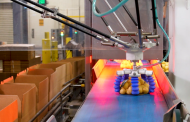In today's diligent customer landscape, the need for fairly sourced and lasting items has surged. Private label food manufacturers have actually emerged as trendsetters in this domain name, frequently working together with contract food manufacturers to spearhead sustainability and liable sourcing campaigns. With a tenacious dedication to ecological principles, private label brand names have made it their objective to provide lasting, top quality options to consumers.
Private Label Food Manufacturers
In the last few years, private label food manufacturers, likewise known as own brand names or store brands, have actually experienced an amazing surge in appeal. These makers generate goods offered under the logo of a retail store, grocer, or exclusive entity. What sets private-label items apart is their ability to offer competitive pricing without jeopardizing on quality.
Contract Food Manufacturers
Several private-label food producers sign up with pressures with contract producers to create their product lines. Agreement food makers are professionals in creating foodstuff for exclusive labels. This strategic collaboration allows private label business to tap into Meat processing techniques the expertise, sources, and dedicated food production facilities of their collaborators.
Sustainability at the Core
Private label food manufacturers employ numerous approaches to improve sustainability within their supply networks:

Moral Sourcing:
Exclusive label firms are progressively devoted to sourcing active ingredients according to ethical and reasonable trade standards. This involves making sure that manufacturers and also employees of raw materials, such as coffee beans, flavors, or chocolate, receive fair compensation for their initiatives.
Regional Sourcing:
Focusing on regional sourcing of ingredients is one more trademark of private-label food manufacturers. This not just minimizes the carbon impact associated with transportation but also supports regional farmers and neighborhoods.
Organic Ingredients:
With the organic food market on the rise, private tags are reacting by integrating natural ingredients right into their product. Organic farming techniques prioritize soil wellness while eschewing artificial chemicals as well as fertilizers.
Sustainable Fish and shellfish:
Private Label Food Manufacturers are diligent in making certain that the seafood they utilize is sustainably gathered, adhering to guidelines established by companies like the Marine Stewardship Council, which promotes responsible angling.
Lowered Food Waste:
Exclusive label business are actively working with minimizing food waste by implementing effective manufacturing procedures as well as establishing products with longer shelf lives. Some brand names are additionally partnering with food rescue organizations to contribute excess food to those in need.
Eco-Friendly Packaging as well as Campaigns
Sustainability initiatives by private-label food producers prolong beyond sourcing active ingredients to encompass product packaging as well as green initiatives:
Sustainable Product packaging:
Personal label brand names have actually welcomed environmentally friendly product packaging options, including recyclable, eco-friendly, or compostable materials. Upgrading packaging to minimize excess material and decrease environmental effect is a top priority.
Waste Reduction:
To lessen wastage, private-label food suppliers enhance item sizes, lower excess product packaging, as well as check out innovative product packaging remedies. Some brands even encourage consumers to join reusing programs.
Energy Effectiveness:
Several exclusive label producers are purchasing more energy-efficient production plants, minimizing water usage, and also embracing renewable resource resources to better minimize their ecological impact.
Carbon Neutral Initiatives:
Some personal brand food producers are taking enthusiastic steps to accomplish carbon neutrality by offsetting their greenhouse gas discharges via reforestation projects and renewable energy credits.
Challenges and also the Roadway Ahead
Despite the substantial strides made in sustainability and accountable sourcing, private-label food makers encounter difficulties. Balancing sustainability with cost-effectiveness can be a delicate act, occasionally calling for concessions on lasting ingredients or the expedition of eco-friendly alternatives.
Nevertheless, the future of private-label food manufacturing holds wonderful assurance. As customer understanding as well as need for lasting products remain to rise, private-label brands and also their agreement food manufacturing companions are most likely to increase their efforts. Collaboration with vendors and also financial investment in sustainable technological breakthroughs as well as openness will certainly be essential in shaping a sustainable future for the market.
Often Asked Inquiries
Q1: What are private label food manufacturers?
Private label food manufacturers produce goods sold under the logo design of a retailer, grocer, or exclusive entity. They supply competitively priced products without compromising on top quality.
Q2: Just how do private label food manufacturers advertise sustainability?
Private label food manufacturers promote sustainability through ethical sourcing, local active ingredient purchase, the use of organic active ingredients, sustainable fish and shellfish methods, and efforts to minimize food waste.
Q3: What environment-friendly packaging choices do private label brands use?
Exclusive label brand names adopt green packaging choices such as recyclable, eco-friendly, or compostable materials. They also revamp packaging to lessen excess product as well as decrease ecological impact.
Q4: What challenges do private label food manufacturers deal with in sustainability efforts?

Stabilizing sustainability with cost-effectiveness is a significant difficulty for private label food manufacturers. This may call for concessions on lasting components or the exploration of environment-friendly options.
Conclusion
Private label food manufacturers are at the forefront of the sustainability as well as accountable sourcing movement within the food industry. Their dedication to moral sourcing, neighborhood procurement, organic active ingredients, as well as lasting practices, as well as their dedication to green product packaging as well as waste decrease efforts, demonstrate their resolution to satisfy the demands of today's eco-conscious consumers.
Despite the obstacles they deal with, private label food manufacturers are poised for an encouraging future. With consumers increasingly prioritizing sustainability, the industry is likely to witness even greater collaboration with vendors, investment in sustainable modern technologies, and a commitment to openness. As we move forward, private label food manufacturers will remain to play an important function fit a much more lasting as well as ethical food landscape for all.